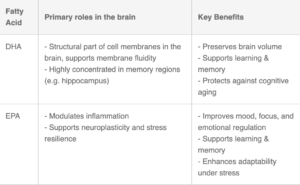5 Science-Backed Strategies to Help Preserve Memory, Focus, and Mental Clarity
By Carol Locke, M.D.
By age 70, the average brain shrinks by nearly 10%, according to research from the Buck Institute and UCSF.1 Even before that, subtle changes in memory, focus, or mental energy often begin decades earlier—sometimes without us realizing it. While genetics play a role, much of how the brain ages is shaped by daily choices—including what we feed it.
Among the most critical—and most overlooked—nutrients for lifelong cognitive health are omega 3 fatty acids, particularly EPA and DHA. These two long-chain fats don’t just influence how we feel—they help build and preserve the very structure of the brain itself.
Recent clinical research has shown that targeted omega-3 interventions can even improve specific issues like memory problems linked to loneliness—a subtle but increasingly important risk factor for cognitive decline.
In this newsletter, I’ll explore how EPA and DHA support memory, focus, and brain volume over time—backed by research and grounded in biology.
And I’ll share five practical, research-backed strategies you can apply daily to support long-term brain health.
Why the Brain Depends on Omega 3s
A review by the University of Chile and the University of Toronto found that DHA makes up as much as 10-20% or more of total fatty acids in key brain regions.2 It’s especially concentrated in regions responsible for memory and learning, such as the hippocampus, as shown by research published in the British Journal of Nutrition.3
EPA, meanwhile, plays a complementary role—supporting mood and neuroplasticity, the brain’s ability to adapt, grow, and form new connections, while reducing neuroinflammation and promoting cognitive resilience under stress.
Together, EPA and DHA:
• Maintain the fluidity of neuronal membranes, essential for communication between brain cells
• Support synaptic plasticity, the foundation for learning and memory
• Help regulate inflammation, a key driver of cognitive decline and brain aging
Both DHA and EPA, the primary omega-3 fatty acids found in the brain, have been shown to increase levels of brain-derived neurotrophic factor (BDNF)—a key protein involved in neuroplasticity, learning, and memory. This effect is supported by both animal and human studies, and is one of the ways omega-3s help protect and enhance cognitive function as we age.4,5
Low levels of omega 3s have been associated with accelerated brain atrophy, poor cognitive test performance, and even reductions in total brain volume on imaging studies.
What the Science Reveals About Omega 3s and the Brain
Mounting evidence from both observational and interventional studies continues to underscore the connection between omega 3s and long-term brain health:
• Memory & Learning: Individuals with higher blood levels of omega 3s tend to perform better on memory and executive function tasks.
A study from Ohio State University even found that omega-3 supplementation improved memory problems linked to loneliness—a growing, underrecognized risk factor for cognitive decline.6
(That trial used the OmegaBrite 7010MD advanced formulation.)
• Structural Brain Changes: MRI studies have shown that higher DHA intake correlates with greater brain volume and slower loss of white matter.
• Mood & Focus: EPA has been studied for its ability to reduce anxiety, support emotional regulation, and improve attention—especially under cognitive stress.
These findings suggest that omega 3 status is not just a marker of good health—but a driver of cognitive preservation over time.
So how can we translate these insights into habits that support the brain every day?
5 Daily Strategies to Protect Your Brain
So how do you put this into practice? While there’s no single formula for protecting cognitive health, these science-based strategies offer a strong foundation:
1. Prioritize Omega 3 Intake
Aim for 1000–2000+ mg of combined EPA and DHA daily, through diet and/or supplements.
These long-chain omega-3s supports brain cell membrane integrity, signaling, and repair mechanisms—foundational processes for protecting memory and cognition over time.
Even healthy young adults can feel less anxious and more resilient with omega-3s. In a randomized study at Ohio State University, medical students who took OmegaBrite 7010MD’s formula for 12 weeks saw a roughly 20% reduction in anxiety compared to those taking a placebo.7 It also helped reduce markers of inflammation, a physiological factor linked to how we handle stress. These findings suggest that omega-3s may help support calm, focus, and stress regulation—even during demanding times.
And if supplementing, be mindful of the specific formulation—not all omega-3 supplements are created equal—the ratio, concentration, and form of EPA and DHA all influence biological effects. This study was done on OmegaBrite 7010MD’s advanced formula but these outcomes have not been demonstrated in studies using standard fish oil products.
2. Adopt a Mediterranean-Inspired Diet
A landmark randomized controlled study published in JAMA Internal Medicine in 2015 followed nearly 500 older adults for over four years.8 It found that a Mediterranean diet—supplemented with either extra virgin olive oil or mixed nuts—significantly slowed cognitive aging compared to a low-fat control diet.
Participants on the Mediterranean diet preserved cognitive function, specifically memory (with nuts—walnuts, hazelnuts, and almonds) and executive function (with olive oil), while those on the control diet experienced significant decline—effectively demonstrating a dietary approach to protecting brain function with age.
To start, aim to include fatty fish in meals often (like salmon or sardines), replace seed oils with extra virgin olive oil, enjoy a daily handful of nuts, and make leafy greens and berries a daily staple.
3. Limit Trans Fats and Ultra-Processed Oils
Industrial fats compete with DHA in the brain’s fatty acid composition and may interfere with healthy cell signaling. Avoid processed foods like fried fast food, non-dairy creamers, and packaged cookies, and check ingredient labels when buying. Look for terms like “partially hydrogenated oils,” “hydrogenated vegetable oil,” or vague “vegetable oil blends.” When cooking at home, opt for olive oil or avocado oil instead of vegetable oil blends.
4. Support Neuroplasticity with Good Sleep and Lifelong Learning
Prioritize consistent, high-quality sleep—it’s when the brain consolidates memories, clears metabolic waste, and reinforces neural circuits. Adults who sleep poorly show faster cognitive decline and reduced memory performance over time.
In addition to sleep, engage your brain daily with activities that challenge and stimulate—reading, learning new skills, or meaningful conversations all help strengthen neural pathways and support long-term resilience. A major study of over 180,000 adults found that those who regularly engaged in learning new skills or ideas had sharper thinking and a 21% lower risk of dementia within five years—regardless of genetics or baseline cognition.9
To put these into practice, try setting a regular bedtime, limiting screen exposure before sleep, and scheduling time for mentally engaging activities—even 20 minutes a day makes a difference.
5. Build Brain Resilience Through Physical Activity
Regular physical activity is one of our most effective tools for protecting brain health. Aerobic exercises—like brisk walking, cycling, swimming, or dancing—increase blood flow to the brain, deliver essential nutrients, and stimulate the release of BDNF (brain-derived neurotrophic factor).
People who stay active tend to have larger brain volumes, stronger memory, and slower cognitive decline as they age. According to research cited by Harvard, participants in one study improved memory by walking briskly for one hour, twice a week—just 120 minutes weekly of moderate activity.10 Standard health recommendations advise 150 minutes of moderate aerobic activity per week, or about 30 minutes most days.
If that feels out of reach, start small. Begin with short walks and gradually add 5 to 10 minutes each week. What matters most is making movement a regular part of your routine
Key Takeaway: Brain Health Is Structural, Not Just Mental
Cognitive resilience is something we can nourish and strengthen throughout life.
Mental clarity and brain health aren’t just about how we feel—they reflect the physical state of our brain cells, the health of our connections, and the nutrients and daily habits that sustain them.
Omega-3 fatty acids play a foundational role in supporting both the structure and function of the brain. Alongside a thoughtful lifestyle—built on healthy food, quality sleep, regular movement, and mental stimulation—they form one of the most evidence-based strategies we have for protecting long-term cognitive vitality.
Try choosing one strategy to begin with—and build from there.
Small, daily choices can strengthen your brain for today—and for years to come.
In health,
Dr.Locke
References:
1. Markov N, Lindbergh C, Staffaroni A, Perez K, Stevens M, Nguyen K, et al. Age-related brain atrophy is not a homogenous process: Different functional brain networks associate differentially with aging and blood factors. Proceedings of the National Academy of Sciences of the United States of America. 2022 Dec;119(49):e2207181119.
2. Sambra V, Echeverria F, Valenzuela A, Chouinard-Watkins R, Valenzuela R. Docosahexaenoic and arachidonic acids as neuroprotective nutrients throughout the life cycle. Nutrients. 2021 Mar;13(3):986.
3. Létondor A, Buaud B, Vaysse C, Fonseca L, Herrouin C, Servat B, et al. Erythrocyte DHA level as a biomarker of DHA status in specific brain regions of n-3 long-chain PUFA-supplemented aged rats. British Journal of Nutrition. 2014 Dec;112(11):1805–18.
4. Ziaei S, Mohammadi S, Hasani M, Morvaridi M, Belančić A, Daneshzad E, et al. A systematic review and meta-analysis of the omega-3 fatty acids effects on brain-derived neurotrophic factor (BDNF). Nutritional Neuroscience. 2023 Jul;27(7):715–25.
5. Sugasini D, Yalagala PCR, Subbaiah PV. Plasma BDNF is a more reliable biomarker than erythrocyte omega-3 index for the omega-3 fatty acid enrichment of brain. Scientific Reports. 2020 Jul;10(1):10809.
6. Jaremka L, Derry H, Bornstein R, Prakash R, Peng J, Belury M, et al. Omega-3 supplementation and loneliness-related memory problems: Secondary analyses of a randomized controlled trial. Psychosomatic Medicine. 2014 Oct;76(8):650–8.
7. Kiecolt-Glaser J, Belury M, Andridge R, Malarkey W, Glaser R. Omega-3 supplementation lowers inflammation and anxiety in medical students: A randomized controlled trial. Brain, Behavior, and Immunity. 2011 Nov;25(8):1725–34.
8. Valls-Pedret C, Sala-Vila A, Serra-Mir M, Corella D, de la Torre R, Martínez-González M, et al. Mediterranean diet and age-related cognitive decline: A randomized clinical trial. JAMA Internal Medicine. 2015 Jul;175(7):1094–103.
9. Takeuchi H, Kawashima R. Effects of adult education on cognitive function and risk of dementia in older adults: A longitudinal analysis. Frontiers in Aging Neuroscience. 2023;15:1212623.
10. Ten Brinke L, Bolandzadeh N, Nagamatsu L, Hsu C, Davis J, Miran-Khan K, et al. Aerobic exercise increases hippocampal volume in older women with probable mild cognitive impairment: A 6-month randomised controlled trial. British Journal of Sports Medicine. 2015 Feb;49(4):248–54.


